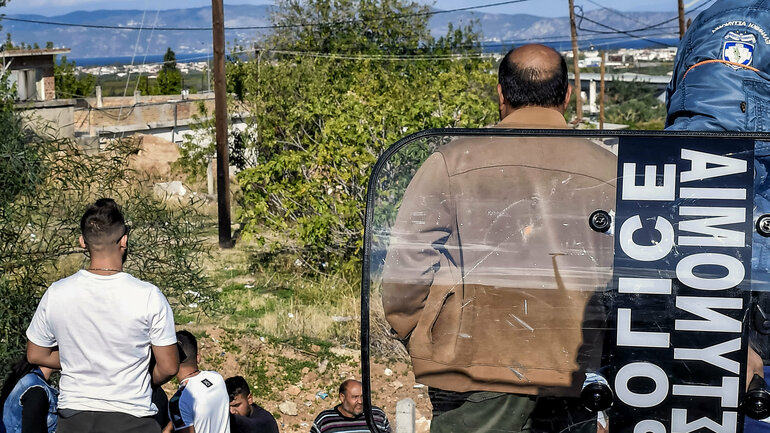The Systemic Discrimination Facing Greece’s Roma

In the early hours of 23 October 2021, police in Athens shot dead Nikos Sampanis, an 18-year-old Roma man, after a car chase and frenzied shooting in which they fired 38 bullets at the fleeing car. The driver and two passengers were aged between 16 and 18 and were unarmed. Their crime was that they had stolen the car. A relatively minor offence, perhaps, but apparently one that can get you killed in Greece if you are Roma.
Internal police communications released after the event revealed several issues, such as the fact that the police knew – and remarked among themselves – that those in the car were members of the Roma community. The police claimed that the driver was trying to harm them by driving towards their motorbikes, indicating that they had opened fire in self-defence. Later, one of the passengers in the car asserted that they had driven towards the motorbikes only after the police started shooting at them, out of fear for their lives.
Racism at all levels of society
The killing has once again unveiled the deep-rooted structural and societal racism against the Roma people in Greece. Just after the event, mainstream media circulated news about the driver being a known criminal who had attacked the police before they shot at the car. This claim was proven to be inaccurate in the following days as more evidence became publicly available. Such misleading media coverage is characteristic of pervasive racist stereotypes about the Roma and, at the same time, entrenches such stereotypes and legitimises racist violence.
A few hours after the shooting, the Greek minister of development and investment, Adonis Georgiadis, tweeted to defend and congratulate the police who had shot at the youths: ‘It is absolutely obvious that the police officers did their job well and protected both their lives and society by defending themselves. Well done.’
Likewise, the minister of civil protection, Takis Theodorikakos, visited the police officers involved to offer them his moral support. In the days and weeks after the event, the hashtag #withthepolice was trending on Twitter in support of the police, while countless disturbing hate statements against the Roma people circulated online. After the release of the internal police communications, a prosecutor summoned the officers in question to testify about the incident in court. When they did so, a crowd including many fellow police officers gathered outside, where they chanted slogans in support of the officers and called them heroes.
Observers may wonder what exactly was heroic about a frenzied shooting of three unarmed young people, which led to the killing of one of them. The answer may lie in the identities of those who were shot at and their status in Greek society.
A marginalised population
With an estimated population of about 265 000, or some 2.5 per cent of Greece’s total, the Roma constitute a significant part of Greek society and for the most part are Greek citizens, yet they remain largely invisible – or rather, negatively visible. According to the 2019 Eurobarometer survey, discrimination against the Roma people is the most prevalent form of discrimination in Greece: 82 per cent of Greek respondents considered the phenomenon very widespread, against an EU average of 61 per cent. A survey by the Pew Research Center found that 72 per cent of the Greek population viewed the Roma people unfavourably.
In the period of austerity after the 2008 financial crisis, members of Greece’s Roma community were identified as being at a much higher risk of poverty (about 95 per cent) than the general population (just over 20 per cent). Marginalisation, infrastructural discrimination, and high rates of illiteracy are also connected to poor living conditions. Such conditions constitute an alarming health risk and, in the case of camps and settlements outside urban centres, are often a ‘disgrace to human dignity and human rights’, in the words of one observer.
According to Dimitrios Bourikos, coordinator of the Forum of Western Attica for Social Integration of the Roma People, a former regional initiative, ‘the Roma status has now been established in the public sphere as a synonym for criminal marginality’. This not only makes the issues the Roma face invisible but also neutralises the hatred and violence suffered by members of their community.
A European problem
The situation facing the Roma people in Greece is dire, and it is not significantly better across Europe. According to the 2019 Eurobarometer survey, 60 per cent of people in Greece would feel totally uncomfortable if their child were in love with a Roma person; the EU average is 30 per cent, which is still alarmingly high. The conditions of the Roma across Europe, and the social exclusion and discrimination they encounter, are disgraceful. As one researcher has put it, reading Amnesty International’s briefing on the state of Roma rights and discrimination in Europe, one could be forgiven for wondering if the briefing really is about Europe.
Christos Varvantakis is a guest researcher at ZOiS from September 2021 to February 2022. He has a background in sociology and social anthropology and received his PhD from the Freie Universität Berlin. He is co-investigator of the Children’s Photography Archive, funded by the European Research Council.